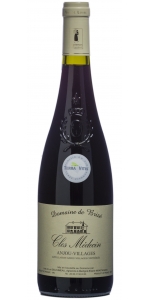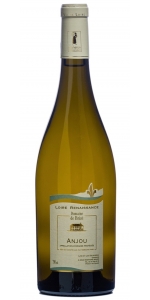Wine from Domaine de Brize

Domaine de Brize is located in the town of Terranjou, in the Maine-et-Loire department of the Loire Valley. The 40 hectare-estate was born in the middle of the 18th century, founded by the Delhumeau family. The winery strived between the two world wars under the leadership of Pierre, a young, innovative, ingenious and combative man who compensated the loss of his mutilated hand during the War. He transmitted his passion for wine to his grandson Marc who followed in his footsteps and ran the property for 30 years, with the assistance of his two brothers. His son Luc joined the family estate in 1989, then his daughter Line came on board in 1992 together with her husband Didier. Brother and sister Luc and Line represent the 5th generation of the family winemakers and the 9th generation in the farm.
The vineyard is planted on highly diversified soils dominated by silico-clay, shale-sandstone and faluns. The viticulture practices meet the 'Terra Vitis' approach in respecting nature, people, the environment and the soil.
Brize Clos Medecin Anjou Villages Rouge is made from 60% Cabernet Franc and 40% Cabernet Sauvignon.
This is the flagship of the Estate. Clos Medecin has been produced at the estate for 90 years. All the grapes for this wine come from a very special parcel. The wine offers red fruit aromas. It is fresh, round and ample in the mouth.
Brize Loire Renaissance Anjou Blanc is made from 100% Chenin Blanc.
Anjou Blanc Renaissance was entirely fermented and aged in French oak barrels. The wine is dry and powerful with an intense bouquet of apricot, vanilla and honey.
Excellent when paired with lobster or white fish with a creamy sauce.
- back
Selected Options
Wineries
Categories
Pricing
Countries
Regions
Grape Types
Wineries
Organic/Free Shipping
Les Noisetiers is a combination of specific lots from within Kistler’s vineyards of designated quality that are situated in far western Sonoma County, near the coast. They began creating Les Noisetiers upon noting that there was an inherent mineral tone which they loved in the lots from their vineyards planted in these coastal sandy Gold Ridge soils.
A classic balance of layered, juicy fruit and mineral backbone. It is delicious wine, with white flowers and stone fruit aromatics leading to a full bodied, juicy core, loaded with flavors of peach, apricots, pineapple and pear.
Larroque Bordeaux Blanc is made from 73% Sauvignon Blanc and 27% Colombard.
No oak.
Color : Pale yellow with green tints.
Nose : Complex aromas of white flowers, exotic fruits, citrus and boxwood, with a touch of minerality.
Mouth : Aromatic, with a nice richness and freshness. Predominant flavors of tart, crisp fruit.
Marie-Christine, the daughter of Henri Ducourt, purchased this prestigious left-bank property in 1979, which lies on the border of the Graves appellation.
The 60-hectare vineyard was rapidly replanted and the château building, which dates from 1348, was restored.
Our family now produces three different-colored wines there: red, white and rosé.
Grown on loamy-clay soil.
Harvest : Machine harvesting in the cool, early morning
Maceration : Skin-contact maceration for several hours, depending on ripeness, and pressing
Fermentation : Beginning of the cold alcoholic fermentation (12°C / 53°F) then an increase in temperature to finish the fermentation at 20°C / 68°F.
Enjoy this wine as an aperitif or during the meal with fish, seafood or chicken salad.






